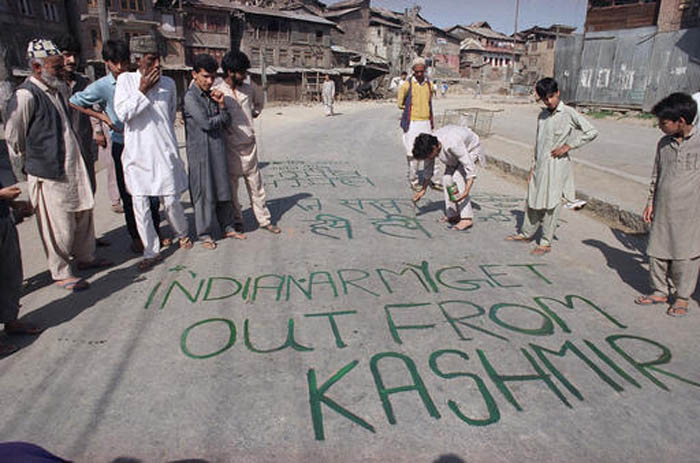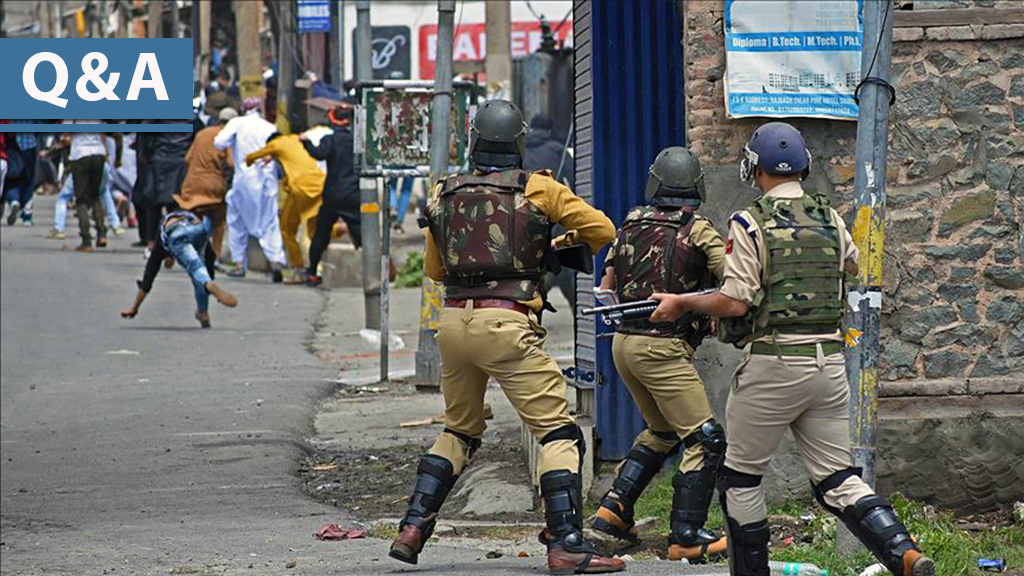اگست 1947 میں برطانوی ہندوستانی سلطنت کی تقسیم ہوئی جس کے نتیجے میں پاکستان اور ہندوستان دو آزاد ریاستوں کے طور پر وجود میں آئے۔ اس سے جمو...
اگست 1947 میں برطانوی ہندوستانی سلطنت کی تقسیم ہوئی جس کے نتیجے میں پاکستان اور ہندوستان دو آزاد ریاستوں کے طور پر وجود میں آئے۔ اس سے جموں و کشمیر تنازعہ کا آغاز ہوا۔ علاقائی خدشات کے علاوہ، یہ مسئلہ کشمیری عوام کے سیاسی، مذہبی، نظریاتی اور بنیادی حقوق کی غیر قانونی قبضے اور خلاف ورزیوں کو گھیرے ہوئے ہے۔ خطے میں بھارت کی طرف سے تشدد اور بربریت کے واقعات بڑے پیمانے پر دیکھے گئے ہیں۔
قائداعظم کے نام سے مشہور محمد علی جناح نے جموں و کشمیر کو پاکستان کی "شہ رگ" قرار دیا۔ مجوزہ حل میں اقوام متحدہ کی سرپرستی میں ایک منصفانہ اور غیر جانبدارانہ استصواب رائے شامل ہے، جس سے کشمیری عوام کو اقوام متحدہ کی سلامتی کونسل کی قراردادوں کے مطابق اپنا حق خودارادیت استعمال کرنے کا موقع ملے گا۔
1950 میں، وزیر اعظم جواہر لعل نہرو اور گورنر جنرل ماؤنٹ بیٹن جیسی شخصیات کی یقین دہانیوں کے ساتھ، جموں و کشمیر کو ہندوستانی آئین کے آرٹیکل 370 کے ذریعے خصوصی آئینی حیثیت دی گئی۔ اس حیثیت کی توثیق 1952 کے دہلی معاہدے اور 1954 کے صدارتی حکم نامے جیسے کہ آرٹیکل 35A متعارف کرانے والے معاہدوں میں ہوئی، پارلیمنٹ کے دائرہ اختیار کو محدود کرتے ہوئے، بعض معاملات پر ریاستی مقننہ کو اختیار دیا گیا۔
تاہم، بی جے پی نے، مودی کی قیادت میں، 2019 میں آرٹیکل 370 کی تنسیخ کی پیروی کی، جس کے نتیجے میں جموں و کشمیر کی خصوصی حیثیت کو ختم کیا گیا۔ قانونی چیلنجوں کے باوجود، بھارتی سپریم کورٹ نے 11 دسمبر 2023 کو ایک فیصلے میں آرٹیکل 370 کو ایک عارضی شق کے طور پر سمجھا، جس سے صدر کی طرف سے اسے منسوخ کرنے کی اجازت دی گئی۔ اس فیصلے نے آئینی مناسب عمل اور کشمیر کی خصوصی حیثیت کے مستقل ہونے پر سوالات اٹھائے۔
سپریم کورٹ نے تسلیم کیا کہ ایک تشریحی شق مقررہ طریقہ کار پر عمل کیے بغیر کسی شق کو تبدیل نہیں کر سکتی، آئینی مناسب عمل کی پاسداری کی ضرورت پر زور دیا۔ اس فیصلے کا مطلب یہ ہے کہ آرٹیکل 370 کے تحت دی گئی حیثیت کو مستقل سمجھا جاتا ہے، اور کسی بھی تبدیلی کے لیے آئینی عمل کی پابندی ضروری ہے۔
آج آئین ساز اسمبلی کی عدم موجودگی صدر کو اس آرٹیکل کو منسوخ کرنے سے قاصر ہے۔ سپریم کورٹ کا صدر کے آئینی حکم کے ایک حصے کو غیر قانونی قرار دینا مستقبل میں قانونی نظرثانی کے لیے ایک ممکنہ دلیل پیش کرتا ہے۔
نتیجہ ہندوستانی آئین کے مختلف آرٹیکلز کی خلاف ورزی پر روشنی ڈالتا ہے اور اس بات پر زور دیتا ہے کہ منسوخی کا عمل من مانی اور قانون کی حکمرانی کے خلاف تھا۔ یہ اس معاملے پر بین الاقوامی توجہ کا مطالبہ کرتا ہے اور کشمیری عوام کے حقوق اور آواز کا احترام کرتے ہوئے دیرپا حل کے لیے منصفانہ رائے شماری کی اہمیت پر زور دیتا ہے۔

Explore the tumultuous journey of Kashmir's special status, legal
battles, and the quest for self-determination in this in-depth analysis.
#Kashmir #LegalAnalysis #UNSecurityCouncil
The British Indian Empire underwent a partition in August 1947, resulting in the creation of Pakistan and India as two independent states. This marked the beginning of the Jammu and Kashmir dispute. Apart from territorial concerns, this issue encompasses illegal occupation and violations of the political, religious, ideological, and fundamental rights of the Kashmiri people. Instances of violence and barbarism by India in the region have been widely observed.
Muhammad Ali Jinnah, known as Quad-e-Azam, termed Jammu and Kashmir as Pakistan's "jugular vein." The proposed solution involves a fair and impartial plebiscite under UN auspices, allowing the Kashmiri people to exercise their right to self-determination, in accordance with UN Security Council resolutions.
In 1950, with assurances from figures such as Prime Minister Jawaharlal Nehru and Governor General Mountbatten, Jammu and Kashmir was granted special constitutional status through Article 370 of the Indian Constitution. This status, reaffirmed in agreements like the Delhi Agreement of 1952 and the Presidential Order of 1954 introducing Article 35A, granted the state legislature authority over certain matters, limiting Parliament's jurisdiction.
However, the BJP, under Modi's leadership, pursued the repeal of Article 370 in 2019, leading to the elimination of Jammu and Kashmir's special status. Despite legal challenges, the Indian Supreme Court, in a ruling on December 11, 2023, deemed Article 370 as a temporary provision, allowing its abrogation by the President. This decision raised questions about the constitutional due process and the permanence of Kashmir's special status.
The Supreme Court acknowledged that an interpretation clause cannot change a provision without following the prescribed procedure, emphasizing the need for adherence to constitutional due process. The ruling implied that the status granted under Article 370 was considered permanent, and any alteration required adherence to constitutional processes.
The absence of a Constituent Assembly today renders the President unable to repeal the article. The Supreme Court's declaration of a portion of the President's Constitutional Order as unlawful suggests a potential argument for future legal review.
The conclusion highlights the violation of various articles of the Indian Constitution and asserts that the abrogation process was arbitrary and against the rule of law. It calls for international attention to the matter and emphasizes the importance of a fair plebiscite for a lasting solution, respecting the rights and voices of the Kashmiri people.







No comments